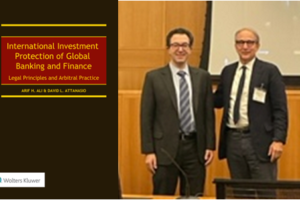War Beyond Law: A Threat to International Legal Order
By: Clea Strydom, Member of the South African Branch of the International Law Association (SABILA)
I had the pleasure of attending the International Law Weekend (ILW) 2021, held virtually from November 28-30 10-12. The theme for ILW 2021 was Reinvesting in International Law. I attended as part of a pilot collaboration between the American Branch and South African Branch of the International Association in my capacity as a member of SABILA.
On the second day of the ILW, Professor Oona Hathaway, Professor of International Law & Counselor to the Dean at Yale Law School, gave the Keynote Address titled War Beyond Law: A Threat to the International Legal Order (you can watch it here). What struck me about the Keynote Address is that it illustrated the real-world relevance of the development and enforcement of International Law by providing numerous political and social examples.

Professor Oona Hathaway
The Keynote Address started by providing an overview of International Law and organizations and the development of the prohibition against the use of force, including the Kellogg-Briand Pact agreement to outlaw war, signed on 27 August 1928, culminating in Article 2(4) of the United Nations Charter (UN Charter) signed on 26 June 1945. Article 2(4) provides that “All members shall refrain in their international relations from the threat or use of force against the territorial integrity or political independence of any state, or in any other manner inconsistent with the purposes of the United Nations.” In essence, it means that States cannot resort to the unilateral use of force. Professor Hathaway is of the opinion that the prohibition against the unilateral use of force i.e., the prohibition on war, is a foundational principle of the modern legal order and not merely an auxiliary provision.
There are, however, several modern challenges to the prohibition. First, cyber-attacks are on the rise. The question is whether such attacks amount to a unilateral use of force, however, up to this point cyberattacks have been mostly below the threshold for an Article 51 of the UN Charter self-defense countermeasure. Article 51 reads that “Nothing in the present Charter shall impair the inherent right of individual or collective self-defence if an armed attack occurs against a Member of the United Nations, until the Security Council has taken measures necessary to maintain international peace and security.” The question for the future is what characteristics a cyberattack will have to possess in order to lawfully warrant an Article 51 response. Examples of cyberattacks in recent years include the Stuxnet computer worm attacks on the Iranian Nantaz plant centrifuges, which resulted in massive infrastructure damage and costs; and Russia’s (allegedly) hack of United States IT management company SolarWinds update that successfully compromised about 100 U.S. companies and about a dozen government agencies.
The second challenge to the foundational principle is partnered operations, where States partner with groups or other States by providing mercenaries, financing, weapons, and/or troops to launch armed attacks without being directly involved. Third, self-defense justifications in terms of Article 51 are getting out of control, and defense operations are starting to look like offensives. The use of force in Crimea by Russia is but one example of this. In line with this challenge is the United States’ “unwilling and unable test” which is only explicitly supported by 10 States, which are mostly States that tend to use force. Voices and opinions from other States on the “unwilling and unable test” are either not present or non-committal. The United States has relied on the test to use force in Syria and for the strike on Iranian commander General Soleimani in Iraq.
The Keynote Address was not all doom and gloom, and Professor Hathaway did provide ways to address the challenges to the use of force prohibition by looking forward. First, force should not be seen as the only or even the best counterterrorism tool, and States should rather look towards combating the conditions on the ground that breed terrorism. Secondly, legal rules regarding the use of force should be clarified especially regarding modern challenges such as cybercrime. Clarification is also important to make the law more accessible so that all affected parties understand their responsibilities and rights regarding the use of force. Finally, the scope of voices and views regarding the use of force needs to be broadened to make the rules more universal, accessible, and fair.
One of the things that stood out during the discussion after Professor Hathaway’s presentation, was that the humanization of war through technology and International Humanitarian Law has detracted from the ultimate goal of peace. This does, however, not mean that we should stop trying to humanize war, because until peace seems within reach, it is all we have.




